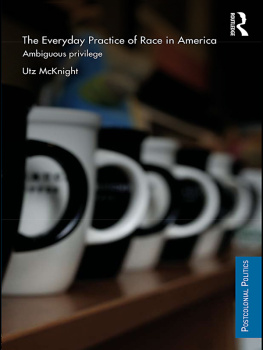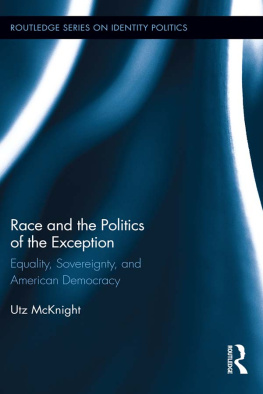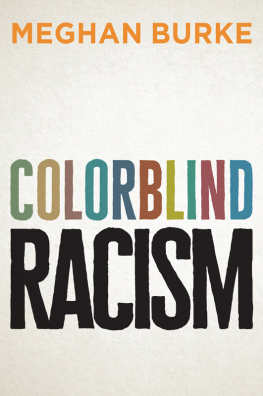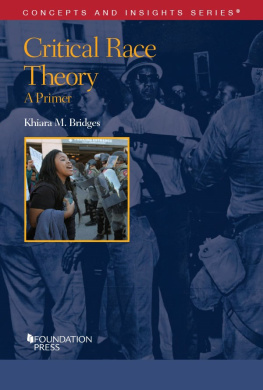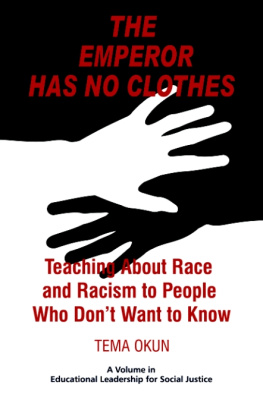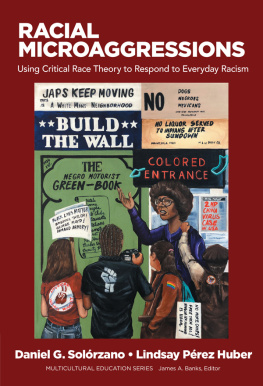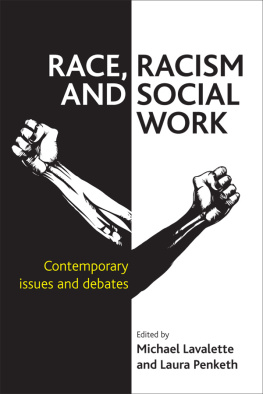The Everyday Practice of Race in America
An original contribution to political theory and cultural studies this work argues for a reinterpretation of how race is described in US society. McKnight develops a line of reasoning to explain how we accommodate racial categories in a period when it has become important to adopt antiracist formal instruments in much of our daily lives.
The discussion ranges over a wide theoretical landscape, bringing to bear the insights of Wittgenstein, Stanley Cavell, Michel Foucault, Cornel West, and others to the dilemmas represented by the continuing social practice of race. The book lays the theoretical foundation for a politics of critical race practice, it provides insight into why we have sought the legal and formal institutional solutions to racism that have developed since the 1960s, and then describes why these are inadequate to addressing the new practices of racism in society. The work seeks to leave the reader with a sense of possibility, not pessimism, and demonstrates how specific arguments about racial subjection may allow for changing how we live and thereby improve the impact race continues to have in our lives.
By developing a new way to critically study how race persists in dominating society, the book provides readers with an understanding of how race is socially constructed today, and will be of great interest to students and scholars of political theory, American politics, and race and ethnic politics.
Utz McKnight is currently an Assistant Professor in the Department of Political Science at the University of Alabama. Prior to this he taught for several years as a Visiting Professor in African American Studies at the University of California at Berkeley.
Postcolonial Politics
Pal Ahluwalia, University of California, San Diego and University of South Australia
Michael Dutton, Goldsmiths, University of London
Leela Gandhi, University of Chicago
Sanjay Seth, Goldsmiths, University of London
Postcolonial Politics is a series that publishes books that lie at the intersection of politics and postcolonial theory. That point of intersection once barely existed; its recent emergence is enabled, first, because a new form of politics is beginning to make its appearance. Intellectual concerns that began life as a (yet unnamed) set of theoretical interventions from scholars largely working within the New Humanities have now begun to migrate into the realm of politics. The result is politics with a difference, with a concern for the everyday, the ephemeral, the serendipitous, and the unworldly. Second, postcolonial theory has raised a new set of concerns in relation to understandings of the non-West. At first these concerns and these questions found their home in literary studies, but they were also, always, political. Edward Saids binary of Europe and its other introduced us to a style of thought that was as much political as it was cultural as much about the politics of knowledge as the production of knowledge, and as much about life on the street as about a philosophy of being, a new, broader and more reflexive understanding of politics, and a new style of thinking about the non-Western world, make it possible to think politics through postcolonial theory, and to do postcolonial theory in a fashion which picks up on its political implications.
Postcolonial Politics attempts to pick up on these myriad trails and disruptive practices. The series aims to help us read culture politically, read difference concretely, and to problematize our ideas of the modern, the rational, and the scientific by working at the margins of a knowledge system that is still logocentric and Eurocentric. This is where a postcolonial politics hopes to offer new and fresh visions of both the postcolonial and the political.
The Postcolonial Politics of Development
Ilan Kapoor
Out of Africa
Post-structuralisms colonial roots
Pal Ahluwalia
The Everyday Practice of Race in America
Ambiguous privilege
Utz McKnight
The Everyday Practice of Race in America
Ambiguous privilege
Utz McKnight
First published 2010
by Routledge
2 Park Square, Milton Park, Abingdon, Oxon, OX14 4RN
Simultaneously published in the USA and Canada
by Routledge
270 Madison Avenue, New York, NY 10016
Routledge is an imprint of the Taylor & Francis Group, an informa business
This edition published in the Taylor & Francis e-Library, 2010.
To purchase your own copy of this or any of Taylor & Francis or Routledges collection of thousands of eBooks please go to www.eBookstore.tandf.co.uk.
2010 Utz McKnight
All rights reserved. No part of this book may be reprinted or reproduced or
utilized in any form or by any electronic, mechanical, or other means, now
known or hereafter invented, including photocopying and recording, or in any
information storage or retrieval system, without permission in writing from
the publishers.
British Library Cataloguing in Publication Data
A catalogue record for this book is available from the British Library
Library of Congress Cataloging in Publication Data
McKnight, Utz Lars.
The everyday practice of race in America: ambiguous privilege /
Utz McKnight.
p. cm. (Postcolonial politics)
Includes bibliographical references.
1. RacismUnited StatesPhilosophy. 2. RacismUnited StatesHistory.
3. RacismUnited StatesPublic opinion. 4. Race discriminationUnited States.
5. PostcolonialismUnited States. 6. Public opinionUnited States.
7. United StatesRace relations. 8. United StatesPolitics and government.
I. Title.
E184.A1M149 2010
305.800973dc22
2009043531
ISBN 0-203-85266-4 Master e-book ISBN
ISBN 13: 978-0-415-78054-4 (hbk)
ISBN 13: 978-0-415-78055-1 (pbk)
ISBN 13: 978-0-203-85266-8 (ebk)
ISBN 10: 0-415-78054-3 (hbk)
ISBN 10: 0-415-78055-1 (pbk)
ISBN 10: 0-203-85266-4 (ebk)
Contents
Acknowledgments
A project such as this depends on the contributions of many people. I would like to thank the Department of African American Studies at UC Berkeley for the time I spent there working as a Visiting Professor. That experience was invaluable to this project. I would like to thank in particular Charles Henry and Michel Laguerre. My heart goes out to the students at Cal. You continue to inspire me. The Department of Political Science at the University of Alabama has been a haven for me, a place with considerate and gracious colleagues, and wonderful students. Ted Miller and Terry Royed have been good friends throughout. David Lanoue was encouraging from the very first day of my arrival at Alabama, and I have yet to hear of a better Chair of a Political Science Department. Rhoda Johnson is a special person who continues to do the real work. Amilcar Shabazz has been an inspiration and fellow traveler for much of this process, and the work is better for it. I also want to thank Al Brophy for showing me how it is done.
Tracy Strong read earlier versions of and provided good advice on several occasions, some of which I listened to. Paul Gilroy was gracious and generous at a moments notice, thank you. Cornel West really comes through; I want to thank him for all he has done. Paul Thomas first showed me that the personal is political, and that the friendship that comes from shared intellectual and social commitments is second to none. Pal Ahluwalia is someone who believes in community and demonstrates his ability to refuse racial politics time and again. Without his support and friendship this project would not have been completed. All of these people have shown me how to do the right thing and that it is possible to make a difference.

